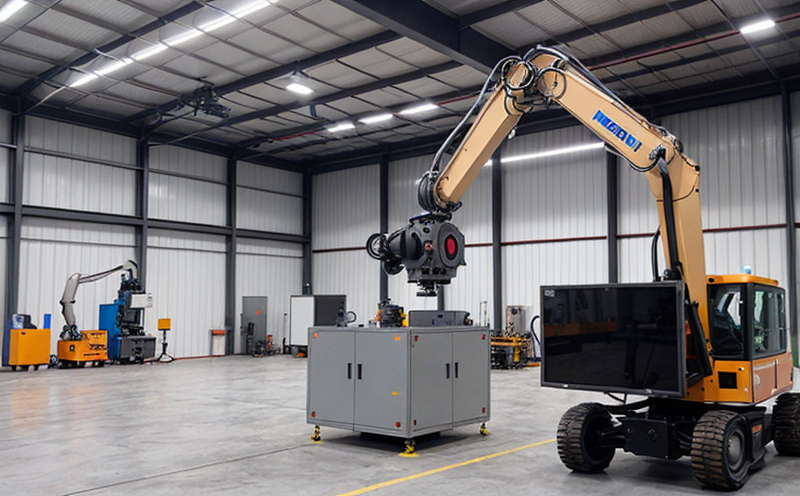EN 61800-5-2 Functional Safety of Robot Drive Systems
The EN 61800-5-2 standard is a critical cornerstone in the realm of industrial and manufacturing robotics, specifically addressing the functional safety requirements for robot drive systems. This standard ensures that these systems are designed, manufactured, installed, commissioned, operated, and maintained with adequate consideration to prevent accidents and injuries.
Robotics technology has seen significant advancements over recent years, making it a vital component in various industries including manufacturing, automotive, healthcare, and logistics. However, the integration of such advanced robots into industrial processes poses new challenges regarding safety. The EN 61800-5-2 standard aims to mitigate these risks by providing detailed guidelines on how to ensure that robot drive systems operate safely within their intended environments.
One of the key aspects covered in this standard is risk assessment and risk reduction measures. It requires manufacturers and operators to conduct thorough evaluations of potential hazards associated with the use of robotic equipment before deployment. Additionally, it outlines procedures for implementing safeguards designed specifically against identified risks.
The scope also encompasses specific tests aimed at verifying compliance with safety criteria throughout all stages from initial design through final installation. These tests include static and dynamic testing which simulate real-world operating conditions under controlled laboratory settings to ensure reliability and predictability of the system performance.
For industrial applications where robots interact closely with human workers, additional considerations are taken into account such as proximity detection systems and emergency stop mechanisms. Compliance with EN 61800-5-2 ensures that these safety features function correctly during actual use conditions, thereby protecting both personnel involved in machine operation as well as bystanders.
Understanding the nuances of this standard is crucial for those responsible for ensuring safe practices within their organizations. By adhering to its provisions, companies not only meet regulatory requirements but also enhance overall operational efficiency by reducing downtime due to malfunctions or incidents related to improper functioning of robot drive systems.
Scope and Methodology
The scope of EN 61800-5-2 covers all aspects necessary for achieving functional safety in robot drive systems used within industrial settings. This includes defining the requirements that must be met during design, production, commissioning, operation, maintenance, and decommissioning processes.
- Design considerations
- Manufacturing standards
- Installation procedures
- Operational guidelines
- Maintenance practices
- Demise regulations
The methodology employed in this standard emphasizes a lifecycle approach to safety management. This means that every stage from the initial conceptualization right through to disposal is considered when assessing risks and implementing appropriate controls.
During the design phase, careful planning ensures that all potential hazards are identified early on so that suitable countermeasures can be incorporated into the system's architecture. In terms of manufacturing, strict adherence to quality assurance protocols helps maintain consistent product performance across different batches or series produced by various suppliers.
Commissioning involves rigorous testing procedures aimed at validating the functionality and reliability of each component before it is put into service. Once operational, regular inspections and updates are essential to keep pace with technological developments and changing safety standards.
Maintenance plays a crucial role in prolonging the lifespan of robot drive systems while minimizing unplanned downtime caused by failures. Properly executed maintenance tasks help identify issues early enough so that corrective actions can be taken before they escalate into more serious problems.
Industry Applications
| Industry Sector | Application Example |
|---|---|
| Automotive Manufacturing | Testing of automated assembly lines for precision and safety. |
| Pharmaceutical Production | Evaluation of robotic arms used in sterile environments to ensure sterility. |
| Logistics & Warehousing | Safety checks on autonomous goods handling systems within warehouses. |
| Healthcare Robotics | Assessment of surgical robots for accuracy and patient safety. |
| Aerospace Manufacturing | Validation of robotic arms used in aircraft assembly processes. |
| Petrochemical Processing | Evaluating industrial robots involved in hazardous material handling tasks. |
- Testing robotic systems for integration into existing production lines without compromising safety.
- Ensuring compliance with international standards to facilitate cross-border trade of robotics equipment.
- Providing assurance that robotic technologies meet stringent environmental impact criteria set by governing bodies.
The versatility and applicability of EN 61800-5-2 extend beyond mere technical specifications; it serves as a bridge connecting cutting-edge technology with robust safety practices across diverse industries. From automotive manufacturing to healthcare robotics, this standard guarantees that industrial robots are not only efficient but also safe for all users.
Eurolab Advantages
At Eurolab, we pride ourselves on offering comprehensive services tailored specifically towards meeting the stringent requirements outlined in EN 61800-5-2. Our team of experts brings together years of experience and state-of-the-art facilities to provide top-notch testing solutions.
- Comprehensive understanding of current regulatory frameworks
- State-of-the-art laboratory equipment for precise measurements
- Certified personnel with specialized training in robotic systems safety evaluation
- Access to latest technological advancements ensuring accurate results
- Robust quality assurance processes guaranteeing consistency and reliability
- Auditable procedures compliant with international standards
- Prompt turnaround times for timely delivery of reports
- Customizable packages catering to individual client needs
We understand that every organization has unique requirements when it comes to assessing the functional safety of their robot drive systems. That’s why we offer flexible and tailored services designed to meet these specific needs while providing peace of mind knowing your equipment meets all necessary safety criteria.
Choose Eurolab for all your EN 61800-5-2 compliance testing requirements, ensuring that your industrial robots are not only innovative but also safe to operate in any environment.





